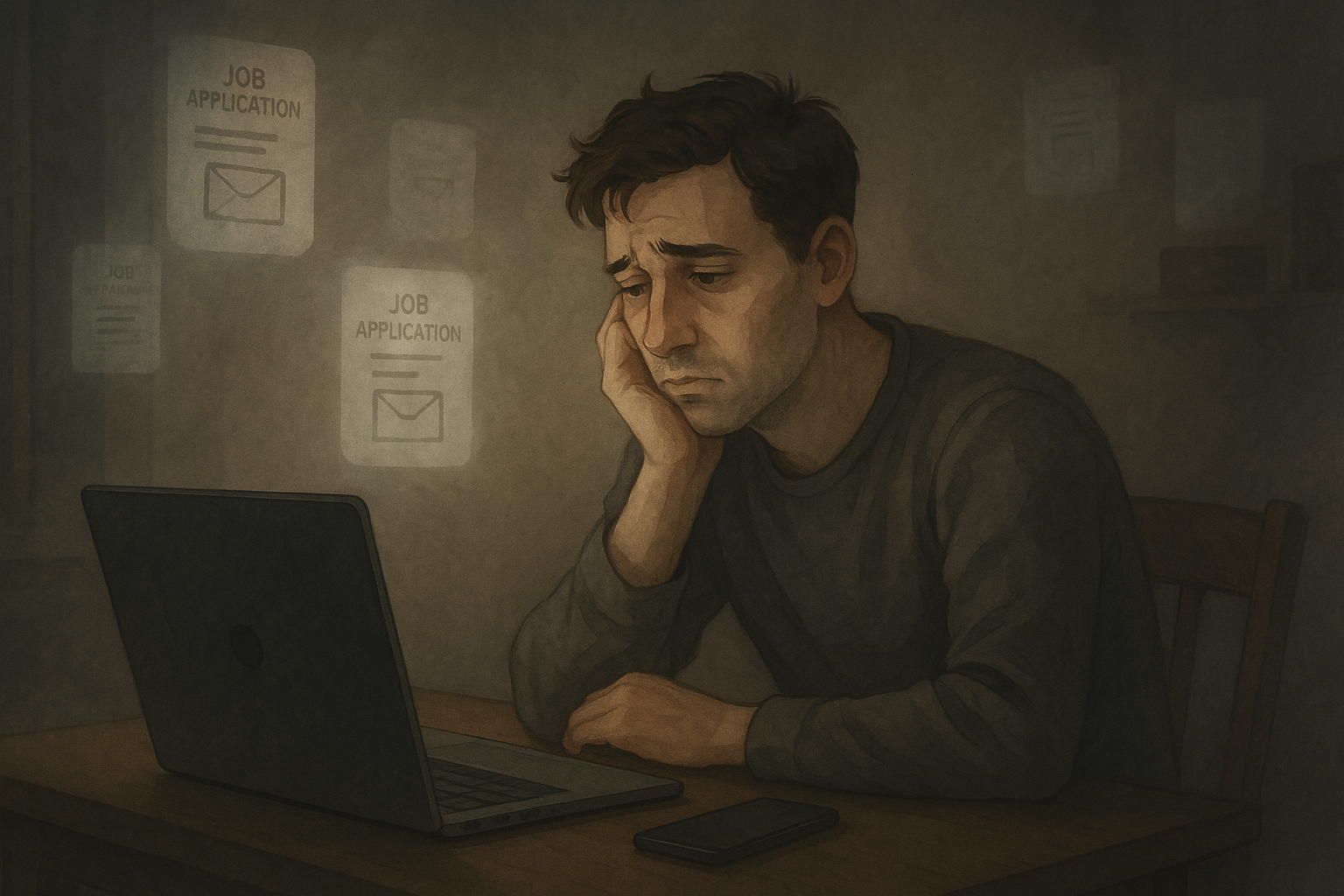The Harsh Truth About Job Ghosting

You’ve been there, haven’t you? You pour your energy into crafting the perfect application. You spend hours prepping for the interview, connecting with the team, and feeling that spark of possibility. You walk away convinced this could be the one. You fire off a thoughtful thank-you note, buzzing with anticipation. And then… nothing. Just silence stretching into an uncomfortable void. Your inbox remains stubbornly empty. Your follow-up emails seem to vanish into cyberspace. That knot in your stomach tightens – you’ve been ghosted.
Table of Contents
If this scenario feels familiar, you are far from alone. In today’s fast-paced job market, experiencing radio silence from recruiters or hiring managers after investing time and hope is incredibly common. It’s more than just impolite; it’s frustrating, confusing, and can seriously dent your confidence during an already challenging process. You start questioning yourself: Was it something I said? Did I misread the room? Why won’t they just tell me?
Understanding the dynamics behind this silence is the first step toward navigating it effectively. This deep dive explores the often-hidden reasons why jobseekers get ghosted, acknowledges the impact it has on you, and most importantly, equips you with practical strategies to respond and even minimize the chances of it happening in the first place. Let’s pull back the curtain on recruiter ghosting and empower you to take back control of your job search narrative.
The Silent Treatment – What Exactly is Recruiter Ghosting?

Before we delve into the why, let’s clarify what we mean by “ghosting” in the job search world. It’s not just a delay in communication. We all know hiring takes time; processes can be complex with multiple stakeholders involved. A week or two of silence, especially after just applying, might simply mean things are moving slowly.
Recruiter ghosting, however, is a distinct pattern: it’s the abrupt and complete cessation of communication from a recruiter or company representative without any explanation, particularly after you’ve had some level of engagement. This could be after an initial screening call, one or several rounds of interviews, or even after discussing potential offer details. You had a dialogue going, perhaps even explicit promises of follow-up, and then – poof. They vanish like a phantom, leaving you hanging.
This communication gap can happen at virtually any stage:
- Post-Application: You submit your resume and cover letter, maybe get an automated confirmation, and then hear nothing further, ever. While common for initial applications due to volume, it still qualifies if expectations weren’t set.
- Post-Screening/Interview: This is often where ghosting stings the most. You’ve invested significant time talking to someone, sharing your experience, and getting your hopes up. Silence here feels much more personal.
- Post-“Final” Stages: Sometimes, even after final interviews or being told you’re a top candidate, the communication inexplicably stops.
Industry surveys and job seeker forums paint a stark picture: a significant majority of candidates report being ghosted during their job search. Some studies suggest upwards of 75-80% of job seekers have experienced this phenomenon. It’s become an unfortunate norm, but understanding why it happens can help demystify the experience, even if it doesn’t excuse it.
Behind the Curtain: Common Reasons Why Jobseekers Get Ghosted
It rarely feels good to be on the receiving end of silence, and your mind might jump to worst-case scenarios about your own performance. However, the truth is often more complex and frequently has little to do with you personally. Here are some of the most common reasons why jobseekers get ghosted:
- Sheer Volume is Overwhelming: This is perhaps the biggest culprit, especially for popular roles at well-known companies. Recruiters can be inundated with hundreds, sometimes thousands, of applications for a single opening. Imagine trying to personally respond to every single applicant, especially those who don’t make it past the initial screening. While Applicant Tracking Systems (ATS) can send automated rejections, setting them up correctly and managing the process for every stage takes time and diligence that recruiters, juggling multiple roles, might lack. They prioritize moving qualified candidates forward, and unfortunately, individualized feedback for everyone else often falls by the wayside.
- Sudden Internal Shifts: The hiring landscape within a company can change rapidly. Perhaps the budget for the role was unexpectedly cut. Maybe the department’s priorities shifted, and the position was put on hold indefinitely. Often, an internal candidate emerges late in the process and is chosen for the role, simplifying the hiring manager’s decision but leaving external candidates in the dark. When these internal pivots happen, communicating the change to external candidates might not be the immediate priority, leading to unintentional ghosting.
- Inadequate Systems or Processes: Not all companies have robust candidate experience management protocols. Their ATS might be outdated or poorly configured, making it difficult to track and communicate with candidates effectively. There might be no clear company policy dictating how and when candidates should be updated, especially those not selected. This lack of systemic support means communication relies heavily on individual recruiter diligence, which can falter under pressure.
- Avoiding Difficult Conversations (and Potential Liability): Let’s be honest: delivering bad news is uncomfortable. Some recruiters or hiring managers may avoid sending rejection notices because they don’t want to deal with potential follow-up questions, arguments, or negative reactions. There can also be a (sometimes overblown) fear of legal repercussions. Providing specific feedback, they worry, could open the door to discrimination claims. While standardized, polite rejections are usually safe, this fear can sometimes lead to defaulting to silence as the perceived “safest” option, however poor it is for candidate experience.
- Laser Focus on the Finish Line: Once a preferred candidate is identified and moves toward the offer stage, the recruiter’s attention naturally shifts dramatically. All their energy goes into securing that candidate, negotiating the offer, and initiating onboarding. In this focused rush, meticulously closing the loop with every other candidate who interviewed can become a lower-priority task that gets postponed and eventually forgotten.
- Simple Human Error and Oversights: Recruiters are human. They juggle multiple requisitions, countless emails, calls, and administrative tasks. Sometimes, things just fall through the cracks. An email intended to be sent gets saved as a draft, a note to follow up gets lost, or amidst the chaos, they simply forget. It’s not malicious, but the impact on you, the waiting candidate, is the same.
- The “Silver Medalist” Limbo: Occasionally, you might be the second-choice candidate. The company extends an offer to their top pick but wants to keep you “warm” just in case the first choice declines or the background check fails. They might intentionally delay sending you a formal rejection, hoping to keep their options open. This strategic silence, while understandable from their perspective, translates directly into frustrating ghosting for you.
Understanding these factors doesn’t make ghosting acceptable, but it can shift your perspective. Often, the silence isn’t a reflection of your worth or qualifications but a symptom of flawed processes, overwhelming workloads, or internal company dynamics completely outside your control.
The Ripple Effect: How Ghosting Impacts Job Seekers

The consequences of being ghosted extend beyond simple annoyance. This practice can have significant and damaging effects on your job search journey and overall well-being:
- Erosion of Confidence and Increased Anxiety: Waiting in limbo, replaying interviews, and wondering what went wrong can severely impact your self-esteem. You might start doubting your skills, your interview performance, or even your entire career path. This self-doubt breeds anxiety, making subsequent applications and interviews feel even more daunting.
- Frustration and Job Search Burnout: Pouring your heart into applications only to be met with silence is deeply frustrating. Repeated experiences can lead to disillusionment with the entire hiring process, fostering cynicism and contributing to job search burnout. Your motivation wanes, and the search starts to feel like a thankless, draining task.
- Damage to Employer Reputation: Ghosting isn’t just bad for you; it’s bad for the company. Candidates talk. They share their negative experiences with friends, colleagues, and online (think Glassdoor, LinkedIn, social media). A pattern of ghosting creates a poor employer brand reputation, making it harder for that company to attract top talent in the future. You remember the companies that treated you poorly.
- Wasted Time and Emotional Energy: The uncertainty forces you to spend valuable time and emotional energy chasing updates that may never come. You might hold off on pursuing other opportunities, hoping this “one” will pan out. This limbo state prevents you from fully committing your focus and energy to other potential roles.
- Hindered Ability to Improve: Without feedback, even a simple “we’ve moved forward with other candidates,” it’s impossible to know if there’s anything you could improve for future applications or interviews. Ghosting denies you the opportunity for closure and learning.
Recognizing these impacts validates your feelings. The frustration and disappointment are real and justified. Acknowledging this is the first step toward managing the emotional fallout and focusing on constructive next steps.
Regaining Control: How to Respond When You Suspect You’ve Been Ghosted

Okay, so you’re pretty sure the silence isn’t just a delay – you’ve been ghosted. What now? While you can’t force a response, you can handle the situation professionally and strategically, primarily for your own peace of mind and to formally close the loop. Here’s a measured approach:
- Double-Check Timelines and Communications: Before sending follow-ups, quickly review any communication you had. Did they give you a specific timeline for feedback? Check your email (including spam folders) to ensure you haven’t missed anything. How long has it really been? Generally, waiting 5-7 business days after a scheduled follow-up date or an interview is reasonable before nudging.
- Craft a Polite and Professional Follow-Up Email: Your goal here isn’t to demand an answer but to gently prompt for an update and reiterate your interest. Keep it brief, professional, and positive.
- Subject Line: Make it easy for them to identify. Something like:
Following Up - [Your Name] - [Job Title] - Body:
- Reference the specific job title.
- Mention the date of your last interaction (e.g., “following up on my interview on [Date]”).
- Briefly reiterate your continued strong interest in the role and the company.
- Politely inquire about the status of the hiring process or if there’s an updated timeline.
- Thank them for their time and consideration.
- Example Snippet: “Dear [Recruiter Name], Hope you’re having a good week. I’m writing to follow up on my application and interview for the [Job Title] position I discussed with you on [Date]. I remain very interested in this opportunity and enthusiastic about the possibility of joining [Company Name]. Could you perhaps provide a brief update on the status of the hiring process when you have a moment? Thank you again for your time and consideration. Best regards, [Your Name].”
- Subject Line: Make it easy for them to identify. Something like:
- Consider a Second (and Likely Final) Follow-Up: If your first polite email goes unanswered after another week or so, you might consider one final attempt. This follow-up should be even briefer and shift slightly in tone – still professional, but indicating you need closure to focus your search efforts elsewhere.
- Example Snippet: “Dear [Recruiter Name], Just sending a final brief follow-up regarding the [Job Title] position. I understand you’re likely very busy. If the role has been filled or priorities have shifted, I would appreciate knowing so I can focus my job search efforts accordingly. I wish you and the team at [Company Name] all the best. Sincerely, [Your Name].”
- Know When to Let Go: This is crucial for your sanity. If two polite follow-ups yield only silence, it’s time to mentally move on. Continuing to chase a non-responsive recruiter drains your energy and takes focus away from potentially promising opportunities. Make a note in your job search tracker (e.g., “No response after 2 follow-ups – closed”) and redirect your efforts. Don’t take it personally – remember the many systemic reasons for ghosting.
Using a Table for Clarity:
Sometimes visualizing the follow-up process helps. While not for ingredients, a table can map out a reasonable approach:
| Stage of Interaction | Suggested Wait Time Before Follow-Up | Recommended Follow-Up Method | Key Message Tone | Purpose |
| Post-Application | 1-2 Weeks (if no timeline given) | Check Online Portal/ATS first | N/A | See if status updated online |
| Post-Screening Call | 5-7 Business Days | Polite Email | Professional, Enthusiastic | Reiterate interest, ask timeline |
| Post-Interview(s) | 5-7 Business Days (or agreed date) | Polite Email | Professional, Engaged | Reiterate interest, seek update |
| No Response to 1st FU | Additional 5-7 Business Days | Final Polite Email | Professional, Seeking Closure | Get clarity to move on |
This structured approach helps you act professionally without becoming overly persistent or investing too much emotional energy into a dead end.
Playing Offense: Proactive Steps to Minimize Ghosting Chances

While you can’t entirely control a recruiter’s or company’s behavior, you can take proactive steps during your job search interactions to foster better communication and potentially reduce the likelihood of being left in the dark:
- Always Ask About Next Steps and Timeline: This is perhaps the single most impactful thing you can do. At the end of every interview or significant conversation, ask: “What are the next steps in the hiring process, and what is the expected timeline for hearing back?” This sets expectations on both sides and gives you a concrete timeframe. Write down the answer!
- Send Prompt and Personalized Thank-You Notes: Within 24 hours of an interview, send a brief, personalized thank-you email to everyone you spoke with. Reiterate your interest and briefly mention something specific you discussed. This reinforces your professionalism and provides another positive touchpoint, making you more memorable.
- Build Genuine Rapport: During your interactions, try to connect with the recruiter and interviewers on a human level (while maintaining professionalism). People are generally less likely to ghost someone they feel a connection with. Show genuine interest in them and the company.
- Leverage Your Network: Applications coming through employee referrals often get higher priority and better communication throughout the process. If you have contacts within a company you’re interested in, explore referral possibilities.
- Target Your Applications: Instead of using a scattergun approach, focus on roles where you are a strong fit. Tailor your resume and cover letter specifically for each application. High-quality, targeted applications are more likely to catch a recruiter’s eye and warrant closer attention.
- Maintain Meticulous Records: Use a spreadsheet or job tracking app to keep detailed notes of every application: company, role, date applied, contact person, interview dates, promised follow-up dates, and communication logs. This helps you stay organized and know exactly when it’s appropriate to follow up.
- Keep Your Communication Clear and Concise: Ensure your emails and voicemails are easy to understand and get straight to the point. Recruiters appreciate clarity and brevity.
By incorporating these strategies, you create more opportunities for clear communication and demonstrate your professionalism, which can sometimes make the difference between getting an update and hearing only silence.
Conclusion: Navigating the Silence with Confidence
Being ghosted during your job search is undeniably disheartening. The silence can feel personal, leaving you questioning your abilities and adding stress to an already challenging process. However, understanding the common reasons why jobseekers get ghosted – the high volume of applications, sudden internal changes, systemic issues, or even simple human error – can help shift your perspective. More often than not, it’s not about you; it’s about their process or capacity.
While you can’t force communication from others, you can control your response. By implementing a strategy of polite, professional follow-ups and knowing when to gracefully move on, you maintain your dignity and conserve your valuable energy. Furthermore, by taking proactive steps like clarifying timelines, sending thank-you notes, and targeting your applications, you actively foster better communication from the outset.
The job search is a marathon, not a sprint. Encountering silence is just one potential hurdle along the way. Don’t let it derail your confidence or your progress. Acknowledge the frustration, use the strategies outlined here to navigate the situation, and keep focused on the opportunities that do value your time and talent. Your resilience and professionalism in the face of silence speak volumes. Keep moving forward – the right opportunity is out there.
FAQ: Answering Your Questions About Why Jobseekers Get Ghosted
Here are answers to some common questions about navigating the silence:
- Q1: Why do recruiters ghost even after a seemingly great interview?
- A: This is particularly confusing! Even with great rapport, ghosting can happen post-interview due to factors unseen by you. They might have had another candidate who just edged you out on one specific skill, an internal candidate might have been selected, the budget might have been pulled, or the recruiter simply got swamped and dropped the ball on non-finalist communication. It rarely means your interview wasn’t actually good; it often means internal factors changed the outcome.
- Q2: How many times should I follow up if I think I’m being ghosted?
- A: A good rule of thumb is one to two polite follow-ups, spaced about a week apart (or based on any timeline they initially gave you). The first follow-up reiterates interest and asks for an update. The second (if needed) is more about seeking closure so you can move on. Persisting beyond that usually yields diminishing returns and can appear desperate.
- Q3: Is getting ghosted a sign I won’t find a job?
- A: Absolutely not. Ghosting is incredibly common and reflects more on current hiring practices, company culture, or individual recruiter overload than on your ultimate employability. Think of it as an unfortunate environmental factor in today’s job market. Don’t internalize it as a judgment of your worth. Persistence and focusing on good applications will lead to success.
- Q4: What’s the most common reason why jobseekers get ghosted by recruiters?
- A: While there’s no single definitive answer for every situation, industry experts and recruiters often point to the sheer volume of applications combined with limited recruiter bandwidth as a primary driver. Managing communication effectively for hundreds of applicants per role, especially those not moving forward, is a significant challenge that many recruitment processes haven’t adequately solved. This is a major factor contributing to why jobseekers get ghosted.
- Q5: Can I provide feedback to a company if I get ghosted? Is it worth it?
- A: You certainly can, but manage your expectations. Sending a very polite, constructive email to the recruiter or hiring manager explaining your experience might provide them useful feedback (if they read it). Posting a factual, professional review on a site like Glassdoor can also alert other candidates. However, the primary goal should be your own closure and moving forward, not necessarily eliciting a response or apology. Focus your energy on your ongoing search.
- Q6: How can I tell if I’m being ghosted or if they’re just genuinely slow?
- A: This is tough! Key indicators lean towards ghosting if: a) significant time has passed beyond any timeline they provided; b) you’ve sent one or two polite follow-ups that have gone completely unanswered; c) you know the role has been filled (e.g., you see the new hire announced on LinkedIn) yet received no notification. If they are just slow, you might eventually get a response, even if delayed. True ghosting implies a complete, permanent cutoff of communication without explanation.
What are your experiences with recruiter ghosting? Do you have any other tips for fellow job seekers navigating this frustrating situation? Share your thoughts and strategies in the comments below – let’s support each other through the job search journey!
